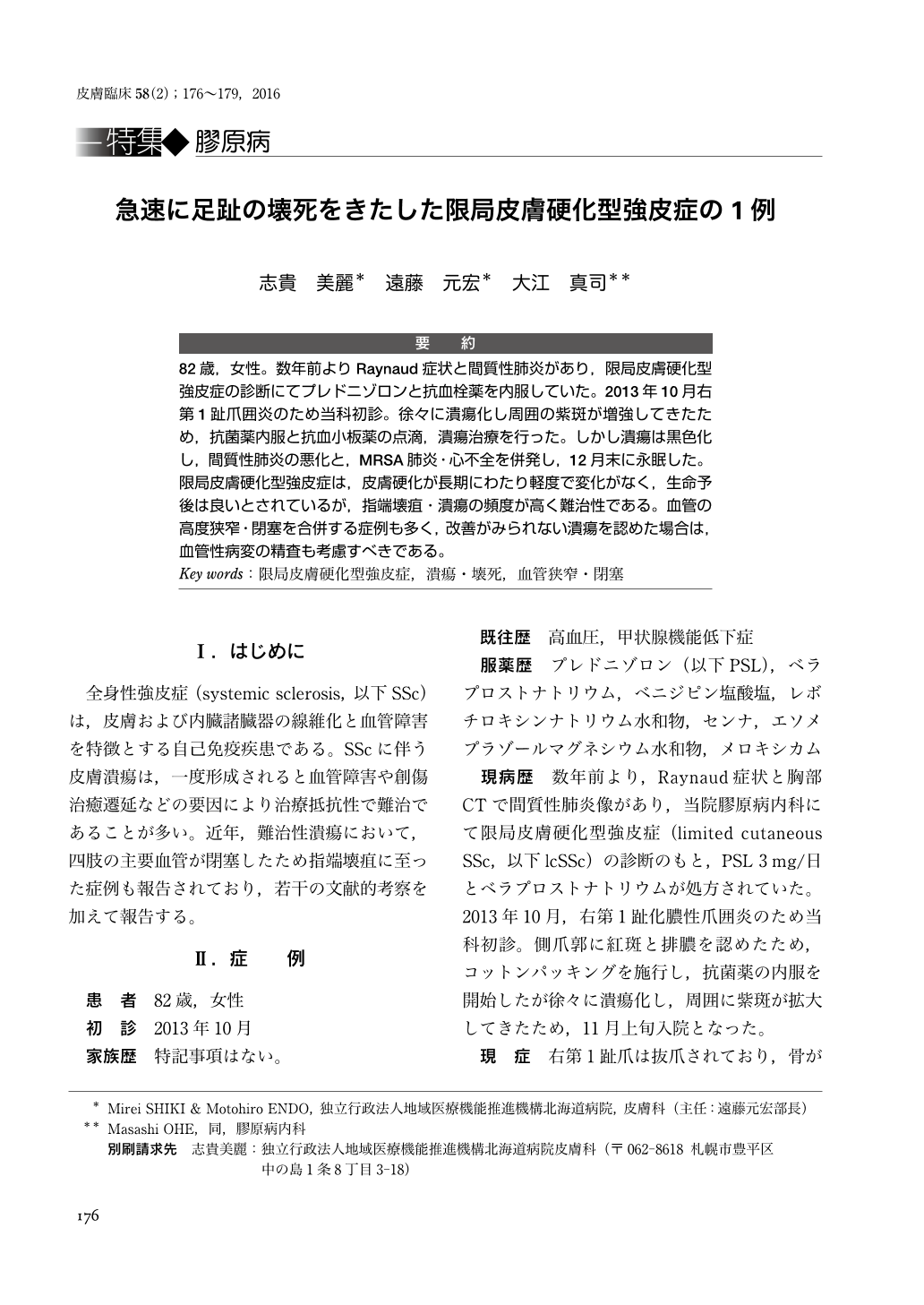- 著者
- 遠藤 元一 木下 和明
- 出版者
- 商事法務研究会
- 雑誌
- 旬刊商事法務 = Commercial law review (ISSN:02891107)
- 巻号頁・発行日
- no.2142, pp.40-51, 2017-08-25
1 0 0 0 国史文献解説
- 著者
- 遠藤元男, 下村富士男 編
- 出版者
- 朝倉書店
- 巻号頁・発行日
- vol.続, 1965
1 0 0 0 OA 循環取引に関する取引法的検討 統一的な判断枠組みの構築に向けて
- 著者
- 遠藤 元一
- 出版者
- 日本私法学会
- 雑誌
- 私法 (ISSN:03873315)
- 巻号頁・発行日
- vol.2014, no.76, pp.219-226, 2014-04-30 (Released:2018-04-01)
- 参考文献数
- 3
1 0 0 0 鎌倉における庶民生活
- 著者
- 遠藤 元男
- 出版者
- 学灯社
- 雑誌
- 国文学 解釈と教材の研究 (ISSN:04523016)
- 巻号頁・発行日
- vol.5, no.5, 1960-04
1 0 0 0 急速に足趾の壊死をきたした限局皮膚硬化型強皮症の1例
82歳女。数年前より限局皮膚硬化型強皮症に対してプレドニゾロン、抗血栓薬内服による加療中であった。2013年10月、右第1趾化膿性爪囲炎のため当科を初診し、側爪郭にコットンパッキングを施行し、抗菌薬の内服を開始したが徐々に潰瘍化し、周囲に紫斑が拡大したため、11月入院となった。採血にてCRP高値を認めたため、抗菌薬の内服を継続し、足趾の潰瘍にはトラフェルミンスプレーとアルプロスタジル、アルファデクス軟膏の外用、血管拡張剤の点滴を開始した。しかし、潰瘍は黒色化し、間質性肺炎の悪化、MRSA肺炎・心不全を併発し、12月に死亡した。
1 0 0 0 OA タイにおける地方小売財閥の形成と展開 -タントラーパン・グループの事例-
- 著者
- 遠藤 元
- 出版者
- 経営史学会
- 雑誌
- 経営史学 (ISSN:03869113)
- 巻号頁・発行日
- vol.36, no.1, pp.28-59, 2001-06-25 (Released:2009-11-06)
As the consumption market expanded in local cities in Thailand in the 1980s, some leading provincial retailers diversified their business rapidly and became “local retail zaibatsu.” Tantraphan Group in Chiangmai city is a typical example.There are two main factors that lead the Tantraphan Group to the rapid expansion and diversification of its retail business. The first factor concerned the character of the local consumption market. Although local markets were expanding, the geographical extent was limited to urban areas. Moreover, big distribution companies from Bangkok as well as local companies entered the limited market, while finance companies expanded their lending business in local cities. Under such market conditions, the Tantraphan Group did not specialize in a specific field of retail business but chose to diversify. The second factor was the characteristic of the family business of the Tantraphan Group. The ownership and management of the group companies were concentrated in the group leader. The group leader could, therefore, make prompt decisions in expanding and diversifying the business.As excessive competition in the local market was obvious in the 1990s, the Tantraphan Group faced a financial crisis and finally decided to sell its department store and shopping center section at a loss to the CRC Group of Bangkok. At the same time, the Tantraphan Group decided to establish a holding company consisting of only the founder's family members and reinforced ownership and control of its subsidiary companies. This behavioral pattern indicates that the group intended to preserve the family property by all means. In this respect the group clearly demonstrated its characteristic as a family business and zaibatsu.At the same time, the Tantraphan Group, to some extent, transferred the authority of its practical business affairs to professional managers. Although it is not clear yet in what forms local zaibatsu will exist in the future, it is surely very difficult for them to expand their business in the unchanged form of family business. The case of the Tantraphan Group shows that local zaibatsu must carry out some kind of reform in their business management, just as the big zaibatsu in Bangkok did.
- 著者
- 遠藤 元一
- 出版者
- 横浜法学会
- 雑誌
- 横浜法学 (ISSN:21881766)
- 巻号頁・発行日
- vol.24, no.2-3, pp.191-227, 2016-03-25
1 0 0 0 飲食
- 著者
- 遠藤元男 谷口歌子著
- 出版者
- 近藤出版社
- 巻号頁・発行日
- 1983


